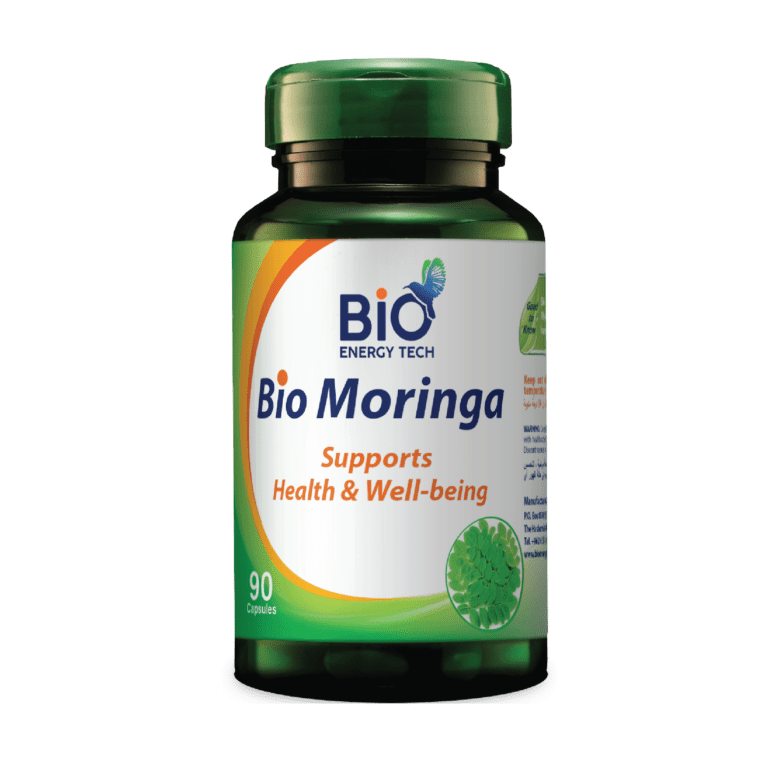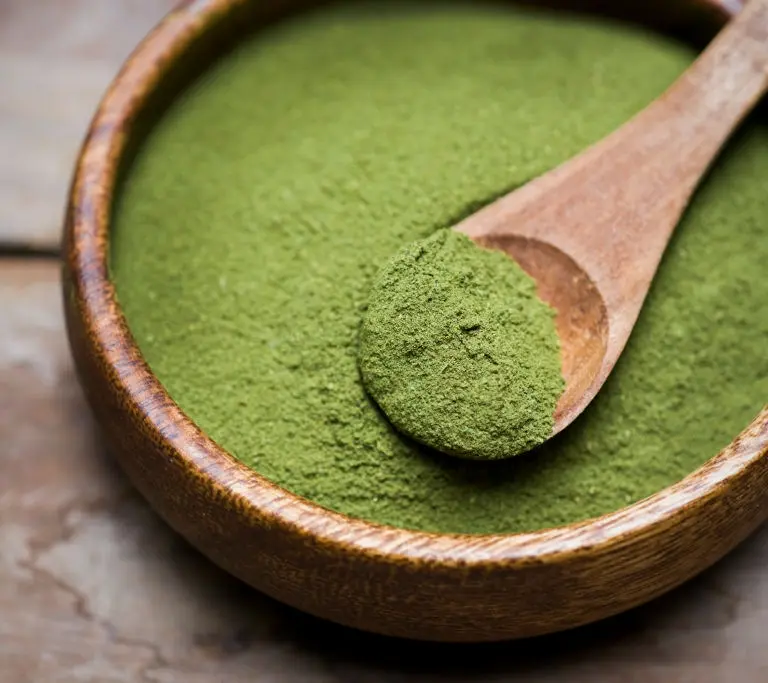Moringa tree (Moringa oleifera) is a herb that has been known for thousands of years. It is found in abundance in India, Pakistan, and tropical countries. It is rich in antioxidants and vital compounds. Moringa is also known as “ben oil tree” or “benzolive tree”.
This super-herb exists in several forms that can be used, such as moringa tea, moringa seeds, and moringa oil. Moringa seeds are roasted then used directly while the leaves can be cooked or dried to be used as a powder.
Moringa is a great source of vitamins, nutrients, minerals, and proteins. The nutritional breakdown of one cup of moringa is as follows:
- Proteins.
- Vitamin (B6).
- Vitamin C.
- Iron.
- Vitamin (B2).
- Vitamin A.
- Magnesium.
- Calcium.
- Phosphorous.
- Folic Acid.
Benefits of Moringa:
- Healthy Hair & Skin:
Moringa seed oil is effective in protecting hair from oxidative free radicals and preserving its strength and texture. Moringa contains a protein that aids in protecting skin cells from damage. Moisturizing and detoxifying elements found in Moringa boost hair and skin vitality.
- Preventing Edema:
Edema is a medical condition in which fluid accumulates in certain tissues of the body such as the feet, lungs, or abdominal cavity. As research has shown, Moringa’s anti-inflammatory properties may be effective in preventing edema from developing.
- Relieving Asthma:
Some studies have shown that consuming Moringa daily for three weeks may relieve symptoms of asthma and respiratory distress in addition to increasing the efficiency of lung function in patients with moderate to mild symptoms.
- Controlling Diabetes:
Some studies have shown that diabetics supplementing with Moringa herb alongside their anti-diabetic medications have observed reductions in their blood sugar readings, especially after meals and in the early morning. Other studies have also shown that consuming Moringa leaves while eating reduces blood sugar readings after meals for patients who do not take any anti-diabetic medications. However, studies did not demonstrate any change in HbA1c reading.
- Increasing Milk Production in Nursing Mothers:
Some studies have shown that consuming moringa tea may increase milk production in breastfeeding women while other studies have shown that milk production in nursing mothers increases after a week of consuming Moringa tea. Currently, no evidence regarding the length of time that Moringa should be consumed to achieve such an effect is available.
- Nourishing Underweight Children:
Some studies have shown that adding Moringa powder to baby food for no more than two months helps increase the weight of children who suffer from malnutrition or malabsorption.
- Alleviating Symptoms of Menopause:
Studies have shown that adding Moringa powder to food for 3 months may help healthy women overcome some symptoms of menopause, such as hot flashes and sleep disturbances.
- Nourishing AIDS patients:
Some studies have shown that taking Moringa in AIDS patients may compensate for their weight loss and help increase their weight. Studies about Moringa’s effect on improving immunity are still ongoing and further research is needed to establish a verdict.
- Repairing Liver Damage:
Studies show that consuming Moringa protects the liver from damage caused by anti-TB drugs. Moringa also can speed up the repair process in damaged liver cells.
- Preventing Cancer:
Moringa extracts contain properties that may help prevent the development of certain cancers. It also contains a compound called Niazimicin, which is preventing the growth of cancer cells, as several studies have shown.
- Supporting the Digestive System:
Moringa may help treat some stomach disorders, such as constipation, gastritis, and ulcerative colitis. It has antibiotic and antibacterial properties that may help prevent the growth of various pathogens. Moreover, its high vitamin B content further supports digestion.
- Strengthening bones:
Moringa contains calcium and phosphorous, which help maintain healthy and strong bones. Besides its anti-inflammatory properties, moringa may help treat conditions such as arthritis and prevent osteoporosis.
- Improving Eyesight:
Moringa contains eyesight-improving properties due to its high levels of antioxidants. Moringa may help dilate the vessels in the retina, prevent capillary membrane thickening, and prevent retinal function impairment.
- Correcting Anemia:
Moringa may help the human body absorb more iron, and it also contains iron, thus contributing to the formation of red blood cells. It is also believed that Moringa is of great benefit in treating and preventing anemia and sickle cell disease.
- Benefits of Moringa still being studied:
Gingivitis, athlete’s foot, dandruff, cancer, pregnancy regulation, diarrhea, headache, heart disease, obesity, hypertension, and fats metabolism.
Side effects of Moringa:
Generally speaking, Moringa seeds and leaves are safe to consume orally for up to 6 months in adults, while in children for up to 2 months only. As for the roots of Moringa, direct oral administration is not safe. Products containing moringa are also safe for up to 3 months of use. There is still insufficient evidence for topical use on the skin.
- Moringa and pregnancy:
Moringa root should not be consumed during pregnancy, as it may lead to uterine contractions or abortion. As for the rest of the Moringa herb, no benefits for pregnancy have been proven so far. Therefore, it is advised to stay clear of Moringa during pregnancy.
- Moringa and Low Blood Pressure:
Some studies are currently underway that moringa herb reduces blood pressure in patients with high blood pressure. Therefore, people who usually suffer from low blood pressure are advised to stay away from the herb moringa because it may increase the decrease in their blood pressure.
- Moringa and Hypothyroidism:
There is still no clear evidence to date that moringa reduces thyroid activity. But patients with hypothyroidism are advised to stay clear from it.
Drug Interactions with Moringa:
There is currently no adequate information or evidence of any drug interactions between Moringa and other medicines.
RELATED PRODUCTS
90 Capsules
Bio Moringa–Moringa Leaf Capsules 500 mg | Natural Multivitamin for Energy, Immunity & Well-being | 90 Capsules | Halal Certified
10.90 JODRead moreRated 0 out of 5






